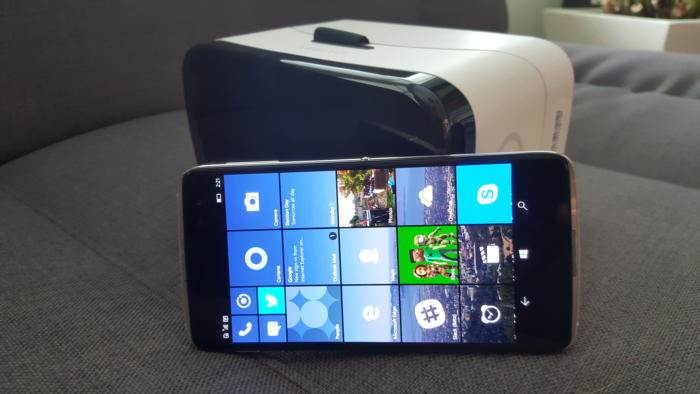At $470, however, it’s still a significant investment.

-
Alcatel Idol 4S (Windows 10)
PCWorld Rating
Alcatel’s Idol 4S is the first Windows phone expressly made for virtual reality. Excellent battery life and performance offset a mediocre camera and lack of apps.
Alcatel’s Idol 4S Windows phone debuts at a time when the news grows ever grimmer for this platform. Market share is below one percent, and Microsoft devices chief Terry Myerson downplayed Windows phones in a recent interview. Acer and HP have offered up corporate Windows phones, but consumer devices have largely disappeared. This is where the Idol 4S hopes to make its mark.
Alcatel’s argument is a simple one: Pay $470 (a bit more than the $400 Microsoft charges for its 5.2-inch Lumia 950) and receive a larger, 5.5-inch phone. Add to that a VR headset and a few subscription freebies—a 45-day free trial of Hulu Plus, a 30-day trial of Microsoft’s Groove Music, and a free copy of the Windows 10 Mobile game, Spartan Assault—and you’re buying the best Windows consumer phone on the market. Not that there’s many of them.
 Mark Hachman
Mark HachmanThe 4S feels light in the hand, though the backing is a bit smooth for my taste.
A Windows clone of an Android phone
Although I haven’t compared the two phones side by side, the Windows version of the Idol 4S on paper appears to be similar to Alcatel’s existing Android version of the 4S—a surprising reincarnation of the strategy HTC employed with Windows and Android versions of the HTC One M8 in 2014.
Like the HP Elite x3 business phone, the Idol 4S is built around excellent hardware, though peripherals and additional services are what really set each phone apart. The phone itself measures 6.06 x 2.97 x 0.28 inches and weighs 0.33 pounds, a bit on the light side. The single-SIM device (sharing a slot with microSD up to 128GB) has a Qualcomm Snapdragon X12 LTE modem.
The metal-and-glass construction of the Idol 4S looks particularly elegant, with a brass metal band sandwiched between the display glass and the plastic backing. Incidentally, the band extends slightly beyond the glass, offering what appears to be a degree of protection.
 Mark Hachman
Mark HachmanThe metal edge of the Idol 4S serves as a bumper of sorts. Note the speaker grille.
The Idol 4S’s 5.5-inch, AMOLED display is where you’ll first discover the differences between the Windows and Android versions. The Android version’s screen is 2560×1440; the Windows version’s is only 1920×1080. The Android version also uses a Qualcomm octa-core Snapdragon 652 chip, while the Windows version includes the more powerful four-core Snapdragon 820. A few other specs favor the Windows phone: Available memory is 3.5GB, versus 3GB for Android, and the included storage is 64GB, double that of the Android version.
In daily use, I was a little surprised that I could stack and stack applications in the background without any apparent slowdown, and everything I threw at the Idol 4S ran fluidly. As our benchmarks demonstrate, the powerful 820 chip places the Idol 4S neck-and-neck with the HP Elite x3 as the most powerful Windows phone.

We use a number of browser-based benchmarks (using the phone’s Edge browser) as a replacement for app-based benchmarks. The Idol 4S is at the top of all of them.
One of the only native Windows phone benchmarks is AnTuTu, which we’ve broken out for clarity’s sake. Again, the Elite x3 and Idol 4S report virtually identical scores.

I was also shocked at how the Idol 4S battery life excelled. The included non-removable 3,000 mAh battery is powered with a USB-C connector, the de facto cable for modern phones. Part of the long life is certainly due to the 1080p display, its relatively low light output (210 nits at full brightness) and the Snapdragon 820’s power management technology. Still, the Idol 4S lasted a whopping 9 hours, 48 minutes looping our 4K test video, topping the Elite x3’s 9 hours and 28 minutes.
Not everything about the phone was so impressive, though. One key omission is NFC support, meaning the phone won’t be able to use Microsoft’s tap-to-pay Wallet app. I also struggled with the rear-mounted fingerprint sensor, which logs you in via Windows Hello. My finger had trouble finding it, and when it did, its accuracy was unreliable.
 Mark Hachman
Mark HachmanIncipio’s desk dock isn’t the most elegant or comfortable, but it gets the job done—provided you have the desk space.
The Idol 4S’s 1.2-watt front-facing speakers pack a solid punch, loud enough to comfortably fill a small room. Unfortunately, pushing the volume above about 20 (out of 30) introduces noticeable distortion at the high end. Earbuds are an option, but you’ll have to supply your own. Though Alcatel’s Android Idol 4S ships with JBL earbuds, Alcatel omitted them from the Windows phone bundle.
The Idol 4S doesn’t ship with a display dock, though Alcatel generously supplied a third-party Incipio Digital AV USB-C multiport adapter to prove that it could run the Continuum experience under third-party hardware. It’s a slightly awkward solution —there’s only one USB port, no ethernet, and the cables place the phone at an awkward angle—but the on-screen experience works.
The Idol 4S camera: competent, with a touch of lag
There are three things you should know about the Idol 4S camera: one positive, one negative, and another somewhere in between. First, the good news: its 21MP rear camera sensor (an IMX230 sensor from Sony) ensures crisp pictures. The other, unfortunately, is characteristic of some other Windows phones we’ve reviewed: When you tap the camera icon to take a picture, there’s a noticeable delay (about half a second) before the picture is actually snapped.
 Mark Hachman
Mark HachmanThere’s a pronounced camera bump on the rear of the Idol 4S. Behind it is the fingerprint sensor.
Not all is lost, however, as there’s a middle ground: the popular camera button. Even with the screen off and locked, pressing the camera key triggers Microsoft’s camera app. (In the Android version of the Idol 4S, this “Boom button” animates the weather and creates photo collages, features not available in the Windows version.) From there you can tap the button again to shoot, or adjust the settings and focus. Still, as a guy who’s constantly trying to snap shots of his kids as they zoom by, the overall delay disappointed me.
 Mark Hachman
Mark HachmanThe camera button on the Idol 4S makes shooting photos a one-button affair.
To test the time to shoot, I took pictures of a stopwatch app beginning with the phone’s screen off, measuring the difference between when I pressed the camera button and what the camera actually recorded. I then averaged the shot times together to generate a final score. A lower time is better. (To be fair, even phones with Windows Hello or a PIN require a few seconds to unlock, pushing the HP Elite x3, for example, out of contention.)

In our photo-quality testing, the Alcatel Idol S performed fairly well, at least in full light. We test four lighting scenarios: studio lights at full brightness, minimum brightness, and then under lamplight with and without flash. I didn’t like how the Idol S performed under low-light conditions, with or without flash. See for yourself:

Our test shots of the Alcatel Idol 4S reveal some serious weaknesses in low light. Upper row: studio lights at full and minimum brightness. Bottom row: lamplight, first without then with flash.
Another possible reason for the lower-quality shots may be the encoder technology. The cameras inside the Acer Liquid Jade Primo and Idol 4S use Qualcomm’s JPG encoder. I discovered that the file size of the first studio photo I shot with the 4S was just 1,345KB, versus 3,670KB for the Lumia 950 at nearly identical resolutions and identical color depths. Sure, Qualcomm’s encoder may be quite efficient. But it’s also possible that quite a bit of digital information is being left on the cutting-room floor, so to speak, degrading the images significantly.
 Mark Hachman
Mark HachmanA photo collage of pictures snapped with the Idol 4S. Some closeup shots look nice, but some exposure issues seemed to crop up in others. HDR shots worked well.
On the other hand, I thought the 8MP front-facing camera shot rather nice selfies. The 84-degree wide-angle lens captures quite a bit in the available frame. Video can be recorded at 1080p (30 frames per second) quality, and played back at 1080p (60 fps).
Something new for Windows: Virtual reality
Unless you have the available funds to pick up a Microsoft HoloLens, the Windows phone world has been basically bereft of augmented or virtual-reality solutions—until now. Each Idol 4S ships with a pair of Idol 4S VR Goggles, and Alcatel clearly intends them to be one of the phone’s chief selling points. Don’t expect to be overwhelmed—with a few exceptions, a lack of available content dims the experience considerably. Generally speaking, though, the available content moves smoothly enough to avoid lag-induced nausea.
 Mark Hachman
Mark HachmanThe Idol 4S holds the phone, lenses and straps together inside of a neat plastic package.
Alcatel was clearly inspired by the Samsung Gear VR, and the same basic hardware design applies here. A front cover snaps off, allowing you to clip in the phone and even store it there. A pair of lenses split your vision into separate screens, helping create the stereoscopic 3D imagery that tricks your brain into thinking what you’re seeing is…







